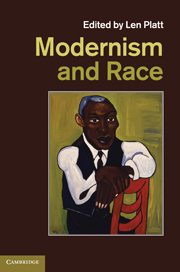Book contents
- Frontmatter
- Contents
- Notes on contributors
- Introduction
- 1 Germanism, the modern and ‘England’ – 1880–1930: a literary overview
- 2 ‘All these fellows are ourselves’: Ford Madox Ford, race and Europe
- 3 ‘’Tis optophone which ontophanes': race, the modern and Irish revivalism
- 4 Generating modernism and New Criticism from antisemitism: Laura Riding and Robert Graves read T. S. Eliot's early poetry
- 5 Race, modernism and the question of late style in Kipling's racial narratives
- 6 Atlantic modernism at the crossing: the migrant labours of Hurston, McKay and the diasporic text
- 7 Claude McKay in Britain: race, sexuality and poetry
- 8 Wyndham Lewis and the modernists: internationalism and race
- 9 ‘Until Hanandhunigan's extermination’: Joyce, China and racialised world histories
- 10 Race, gender and the Holocaust: traumatic modernity, traumatic modernism
- Index
- References
6 - Atlantic modernism at the crossing: the migrant labours of Hurston, McKay and the diasporic text
Published online by Cambridge University Press: 03 May 2011
- Frontmatter
- Contents
- Notes on contributors
- Introduction
- 1 Germanism, the modern and ‘England’ – 1880–1930: a literary overview
- 2 ‘All these fellows are ourselves’: Ford Madox Ford, race and Europe
- 3 ‘’Tis optophone which ontophanes': race, the modern and Irish revivalism
- 4 Generating modernism and New Criticism from antisemitism: Laura Riding and Robert Graves read T. S. Eliot's early poetry
- 5 Race, modernism and the question of late style in Kipling's racial narratives
- 6 Atlantic modernism at the crossing: the migrant labours of Hurston, McKay and the diasporic text
- 7 Claude McKay in Britain: race, sexuality and poetry
- 8 Wyndham Lewis and the modernists: internationalism and race
- 9 ‘Until Hanandhunigan's extermination’: Joyce, China and racialised world histories
- 10 Race, gender and the Holocaust: traumatic modernity, traumatic modernism
- Index
- References
Summary
The currents of what Hannah Arendt called race-thinking run deep, apparently, and generations of scholars have productively plumbed those depths. Humanists and social scientists have studied the legal, scientific and historical archives of race, and examined its origins and effects as a formative discourse. They have tracked its phrenological and genetic definitions, its production within a visual or bodily regime and its authorising of a capitalist labour economy, especially in Atlantic-world slavery. Yet there is a persistent and central pattern of race-thinking in Western modernity that has not been sufficiently studied, and which will form the backdrop of this chapter: the discourse in which races are ranked by their capacity for freedom. Beginning in the seventeenth century, this articulation of race emerged under multiple contact-zone and colonial conditions, where class-inflected, intra-European distinctions between Saxon and Norman, Celtic and Gothic or Norman and Frank interacted with distinctions among European, African, Oriental and Amerindian. As I documented in Freedom's Empire (2008) and will briefly review in the first part of this chapter, within this charged discursive network, over three centuries and under intense political and economic pressures, ‘race’ got worked and reworked until by the early twentieth century in the West it emerged as the defining term – for history, identity and political destiny. The British, in particular, came to fashion themselves as a people with an inherent, racial will to freedom.
- Type
- Chapter
- Information
- Modernism and Race , pp. 116 - 136Publisher: Cambridge University PressPrint publication year: 2011
References
- 11
- Cited by



